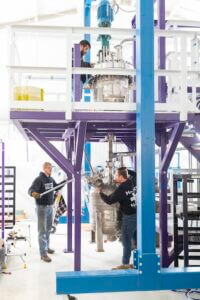
Abilene Christian University is part of a consortium of 12 universities and 12 national laboratories recently awarded $25 million over the next five years from the U.S. Department of Energy National Nuclear Security Administration (NNSA) to support the science that underlies its nuclear security and nonproliferation missions.
Led by the Georgia Institute of Technology, the Consortium for Enabling Technologies and Innovation (ETI) 2.0, of which ACU is a part, will advance technologies across three core disciplines: data science and digital technologies in nuclear security and nonproliferation, precision environmental analysis for enhanced nuclear nonproliferation vigilance and emergency response, and emerging technologies. A second group – the Enabling Capabilities in Technology Consortium – will also receive $25 million as part of a separate agreement.
“These consortia are critical to the future of NNSA’s nuclear security and nonproliferation research and development work,” said Jeff Chamberlin, head of NNSA’s nonproliferation efforts. “Once they develop a concept, the national laboratories can iterate and test its capabilities until it’s ready for the private sector to adopt. I am confident these teams led by the University of Tennessee and Georgia Tech are up to the challenge and will make outstanding contributions to our field.”
In addition to Georgia Tech and ACU, the ETI 2.0 consortium includes Colorado School of Mines, the Massachusetts Institute of Technology, the Ohio State University, Rensselaer Polytechnic Institute, Stony Brook University, Texas A&M University, University of Alaska Fairbanks, the University of Texas at Austin, University of Wisconsin–Madison and Virginia Commonwealth University. At ACU, the research connected to this grant is led by Dr. Rusty Towell, professor of engineering and physics; Dr. Jim Drachenberg, professor of engineering and physics; and Dr. James Johnstone, assistant professor of chemistry and biochemistry.
These 12 universities will partner with 12 national laboratories: Argonne National Laboratory, Brookhaven National Laboratory, Idaho National Laboratory, Lawrence Berkeley National Laboratory, Lawrence Livermore National Laboratory, Los Alamos National Laboratory, Nevada National Security Site, Oak Ridge National Laboratory, Pacific Northwest National Laboratory, Princeton Plasma Physics Laboratory, Sandia National Laboratories and Savannah River National Laboratory.
The work of ACU’s Nuclear Energy eXperimental Testing Lab is sponsored by Natura Resources LLC. ACU is part of the Natura Resources Research Alliance – along with Georgia Tech, Texas A&M and The University of Texas at Austin – which is working to license and deploy the Natura MSR-1, a 1 megawatt thermal Molten Salt Reactor, on the ACU campus.
NEXT Lab
The mission of ACU’s NEXT Lab, powered by Natura Resources, is to provide global solutions to the world’s need for energy, water and medical isotopes by advancing the technology of Molten Salt Reactors while educating future leaders in nuclear science and engineering. Students work alongside faculty seeking creative solutions to complex problems, gaining real-world experience and seeing firsthand how innovation and collaboration can impact the world. NEXT Lab provides extraordinary opportunities through ACU’s departments of engineering and physics, chemistry and biochemistry, and others.
Natura Resources
Natura Resources LLC is a leading advanced reactor developer committed to answering the world’s increased demand for reliable energy, medical isotopes and clean water by developing commercially deployable molten salt reactors. Natura’s small modular reactors are liquid fueled and molten salt cooled, which increases efficiency and reduces waste. Natura’s first reactor design, Natura MSR-1, is the basis of the first liquid salt-fueled molten salt reactor design ever reviewed by the U.S. Nuclear Regulatory Commission. Natura is intensely focused on performance. Founder and president Douglass Robison is a third-generation oilman with a proven track record of revolutionizing the energy industry with innovative technology and results.
— Wendy Kilmer
July 25, 2024
